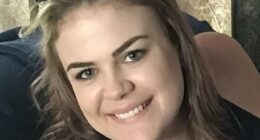Money wasn’t always tight in the Armstrong family, but it became so very suddenly when Cath and her husband both happened to lose their jobs in the same week.
Cath then found out she was pregnant with Hannah, her third child, just as the family finances were at their most precarious.

As a result, the family had to tighten up their spending quick smart.
Hannah, 29, told 9news.com.au that growing up in a frugal household helped her become very smart about how she spent her money.
“It helped me understand the value of a dollar and the hard work that goes into actually getting your money and the things that you want,” she said.
“It’s been built into me from a young age to not go into debt and to save for things.
“I remember being young and saving for the Olympic Barbie that came out in 2000 for Sydney, and to save for the roller skates and toys I wanted. I would do little chores around the house to get five and 10 cents to put towards it.”
These days, as a second-generation cheapskate, Hannah follows a strict budgeting regime which helps her keep her weekly grocery bill down to just $50 a week.
Those money management skills appear to have paid off for Hannah.
Four years ago, at the age of 25, Hannah bought her first home – a three-bedroom house in Gippsland, south east victoria.
Hannah spent two years saving up a $55,000 deposit towards the $270,000 property on her single income.
The feat is even more remarkable because, for almost half of that two-year period, Hannah was working part time.
A trained hairdresser, Hannah had to give up on her career because the chemicals used in the hair dye left her hands cracked and bleeding.
She then began working in customer service part-time, before taking on full-time work in the same industry.
Prior to saving for her house deposit in 2019, Hannah had squirrelled away enough money – on an apprentice wage of less than $380 a week – to travel to Europe for a month and buy her own car.

Hannah said even though she was sticking to a very strict budget, she was surprised by how soon she was able to save up her deposit and afford her own home.
“I put my head down and started saving during Covid, so I wasn’t going out or doing anything, which helped,” she said.
“But I was kind of shocked that I was able to do it, actually.
“It was one of those things that I didn’t think I would be able to do so young by myself.”
Cash stuffing and budget vigilance
Hannah describes her method of money management as “very old school”.
“I get paid fortnightly. So every fortnight I sit down with a pen and paper, write out what I’ve received, and then go through my budget,” Hannah said.
“I budget down to the cent. Everything has a purpose.”
Hannah has 10 bank accounts, one for each category of spending, as well as a savings and emergency fund.
However, Hannah’s payment method of choice is cash and she follows the Generation Z cash stuffing trend of separating her cash funds into different envelopes.
“I pay cash for a lot of things, just because it’s so much easier to keep track of and budget with,” Hannah said.
“My bills and my mortgage are all paid online, but everything else is cash.”

At a time when food inflation has left many despairing at the checkout, Hannah manages to stick to a tiny grocery budget.
“My budget for my groceries, which includes toiletries, cleaning supplies and treats for my dog is $200 a month,” Hannah said.
In order to make those savings, Hannah avoids processed foods, makes all her meals from scratch and buys in bulk.
“For my meat, I go to the butcher maybe two or three times a year and buy in bulk and that usually does me for the year,” she said.
“I go to farmers markets and independent fruit and vegetable stores. They’re a lot cheaper, also I feel like (the produce) lasts a lot longer.
“Everything else – so that’s my flour, butter and milk – usually comes from one of the three supermarkets in town.”
When it comes to entertainment and socialising with friends, Hannah has a strict budget too.
“I have what I call ‘mad’ money. That’s what I can spend on treats for myself, going out, having a coffee, or going to have a cocktail with friends,” Hannah said.
“Once that’s gone, it’s gone. I can’t go out and buy a coffee or anything like that.”
Hannah said she saved a lot of money by entertaining her friends at home.
“You don’t have to go out for a coffee or drink, and it’s a lot cheaper and a lot nicer,” she said.
Despite the cost-of-living increases, Hannah said she was still managing to make extra repayments on her mortgage and hoped to have it all paid off in five to seven years.
Hannah said her advice to other young people struggling to get into the housing market was to not go above your means.
“A lot of people want their dream house straight off the bat, but you can work up to that later,” she said.
“You’ve got to prepare yourself, just in case anything does happen, like interest rates at the moment.
“When I was looking at buying a house, I calculated what I could afford up to a 10 percent interest rate.”
Hannah said she wore being a cheapskate as a badge of honour.
“I’ve grown up with it, and honestly, I wouldn’t have it any other way,” she said.







